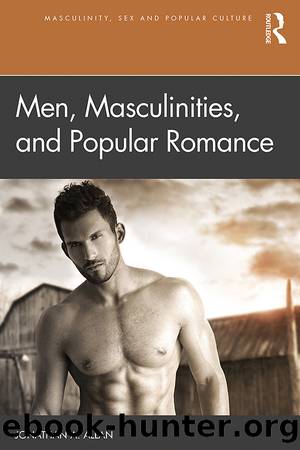Men, Masculinities, and Popular Romance by Jonathan A. Allan

Author:Jonathan A. Allan [Allan, Jonathan A.]
Language: eng
Format: epub
Tags: Social Science, Gender Studies
ISBN: 9781351240000
Google: bC27DwAAQBAJ
Barnesnoble:
Goodreads: 46265740
Publisher: Routledge
Published: 2019-10-31T01:32:15+00:00
I am still inclined to agree with the position that it is not the role of the literary scholar to determine which works represent the âstrongest romance novels.â Simply, I am not even sure how one would go about determining âgreatnessâ or âstrengthâ with regards to the genre. What qualities would be required? The novels, thus, that I set out to study are limited only in terms of their content insofar as I do not engage with ones that include fantastic elements, for example, nor do I consider historical novels. My inclusion criterion is that the novels must be contemporary romance novels and accessible to a general reading public, which is to say that they be published material. My goal, then, is not to limit myself to the âbestâ or the âstrongestâ romance novels, and if these novels happen to be among the âbestâ or the âstrongest,â that is merely happenstance. What is important for this study is that these novels address men and masculinities. Indeed, more and more, I find myself agreeing with Frye, who noted in an interview that âthe real, genuine advance in criticism came when every work of literature, regardless of its merit, was seen to be a document of potential interest, or value, or insight into the culture of the ageâ (1996â2012: vol. 24, p. 754). These works are interesting because they represent the values, interests, insights, and even pleasures and desires of a particular moment.
One of the most significant challenges of studying the male/male popular romance novel centres upon the question of authority. Perhaps I am too Barthesian in my approach, in that I am less interested in the author and more interested in the text itself, recalling here Barthesâ famous conclusion that âthe birth of the reader must be at the cost of the death of the authorâ (1977: p. 148). Nonetheless, I have previously observed that one of the most persistent criticisms of the male/male romance novel is that âgay men, by and large, are not writing these novels about themselves. In other words, their voices and experiences have been appropriated by those who have little or no experience as gay menâ (2016: p. 68). I acknowledge this criticism, but, as noted, I am not inclined towards it. While this may well be an important critique, it is not one with which I wish to grapple; instead, I am more interested in why readers might desire and consume these novels. Often enough, that scholarship gets bogged down by the weight of criticism, of finding problems close to what Sedgwick (2003) might called âparanoid reading,â and in so doing it often misses out on more mundane questions of readerly pleasure and desire. Even with all of the problems that scholars can find â and we can find plenty â readers still buy, desire, and consume the novels (even after weâve pointed out all the problems!). This challenge seems to me more interesting and more productive. As such, I set out here to think
Download
This site does not store any files on its server. We only index and link to content provided by other sites. Please contact the content providers to delete copyright contents if any and email us, we'll remove relevant links or contents immediately.
The Power of Myth by Joseph Campbell & Bill Moyers(1049)
Half Moon Bay by Jonathan Kellerman & Jesse Kellerman(979)
Inseparable by Emma Donoghue(974)
A Social History of the Media by Peter Burke & Peter Burke(968)
The Nets of Modernism: Henry James, Virginia Woolf, James Joyce, and Sigmund Freud by Maud Ellmann(890)
The Spike by Mark Humphries;(805)
The Complete Correspondence 1928-1940 by Theodor W. Adorno & Walter Benjamin(773)
A Theory of Narrative Drawing by Simon Grennan(773)
Culture by Terry Eagleton(770)
Ideology by Eagleton Terry;(730)
World Philology by(711)
Farnsworth's Classical English Rhetoric by Ward Farnsworth(710)
Bodies from the Library 3 by Tony Medawar(707)
Game of Thrones and Philosophy by William Irwin(705)
High Albania by M. Edith Durham(697)
Adam Smith by Jonathan Conlin(685)
A Reader’s Companion to J. D. Salinger’s The Catcher in the Rye by Peter Beidler(674)
Comic Genius: Portraits of Funny People by(648)
Monkey King by Wu Cheng'en(644)
